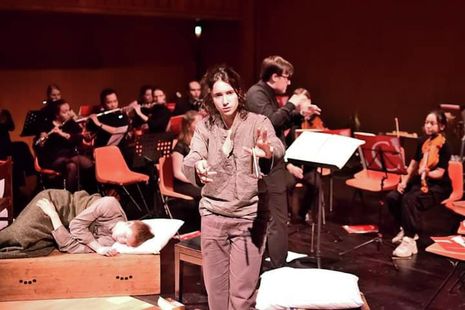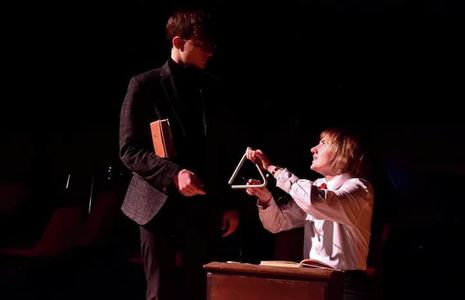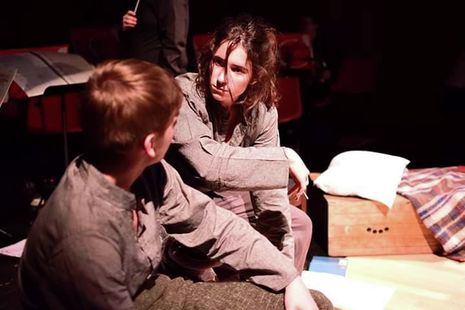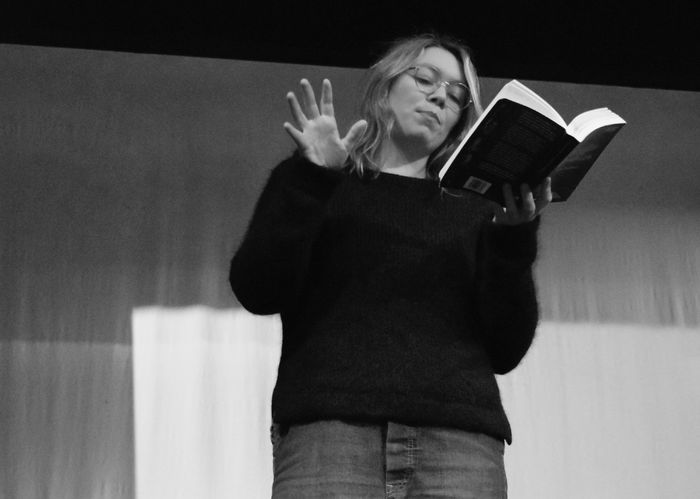Every Good Boy Deserves Favour is a seamless take on a challenging work
Tabitha Dunthorne is impressed by this swirling, twitching exploration of music and memory

Every Good Boy Deserves Favour centres around two (surprisingly posh sounding) Soviet inmates of a psychiatric hospital, one of whom is sane and politically righteous and the other of whom is...interesting. The live orchestra which serves as a reconstruction of Ivanov’s (Lara Cosmetatos) imagination is by far the best thing about the play. Opening on Ivanov silently conducting, the audience becomes gradually more aware of the importance of sound with music becoming inextricably linked to the themes, such as memory and sanity, which dominate the play. That being said, don’t go in expecting a beautiful score; most of the time the music of the orchestra was more raw and angry than pretty. As with the acting, any mistakes were recovered smoothly, and there was a real sense that the orchestra –spatially as much as anything else– dominated the play.
The cramped space of the stage, pushed up between the audience and the orchestra, was claustrophobic in a way which worked well with the plot and ideas of the play. The lack of stagehands, the few actors, and the few breaks in the play help drive this sense of closeness that was one of the most remarkable points about the show. Similarly, the lighting is simple and understated except for the single white spotlight around the climax of the play, as opposed to the yellow light throughout; this marked contrast was a great artistic choice. Simplicity really enabled the play to do what it did well under the constraints of student theatre.

Although not technically the protagonist, Lara Cosmetatos’s androgynous portrayal of Ivanov definitely felt like the charismatic centre of the play, her performance enhanced by the character’s twitchy charm. This may also be due to the comparatively bland character of Alexander, played by Dominic Carrington with admittedly as much scope that could be allowed next to significantly more interesting characters. The only competition for Ivanov was the conductor of the orchestra, who glared at everyone who came in late and who seemed like he should’ve gotten a bigger role somehow. In fairness, I’ve never seen a conductor below the age of 103 so if I was a student conductor I would probably want attention too. And of course, there was the Colonel/doctor of philology (Jasper Cresdee-Hyde), confirming what we all know to be true, that linguistics students are terrifying.

This show was simply and convincingly good – the technical aspects were seamless, the acting was almost as well performed as the music, and the music was great. It wasn’t necessarily the most imaginative or ambitious take on the script, but on a low budget and with approaching week 5 breakdowns this actively worked in the show’s favour: nothing went wrong or didn’t land, so it was a solid if not particularly exciting production. The issue with giving a show 4 stars is that it can mean anything from just above average to amazingly well done but not quite one of the best shows you’ve ever seen. This play falls in the upper half of that spectrum. Ultimately, however, the thing which stuck with me the most about this play was my search for an answer to this question: why is the Doctor’s violin so tiny?
 Features / Should I stay or should I go? Cambridge students and alumni reflect on how their memories stay with them15 December 2025
Features / Should I stay or should I go? Cambridge students and alumni reflect on how their memories stay with them15 December 2025 News / Cambridge study finds students learn better with notes than AI13 December 2025
News / Cambridge study finds students learn better with notes than AI13 December 2025 News / Dons warn PM about Vet School closure16 December 2025
News / Dons warn PM about Vet School closure16 December 2025 Comment / The magic of an eight-week term15 December 2025
Comment / The magic of an eight-week term15 December 2025 News / News In Brief: Michaelmas marriages, monogamous mammals, and messaging manipulation15 December 2025
News / News In Brief: Michaelmas marriages, monogamous mammals, and messaging manipulation15 December 2025









